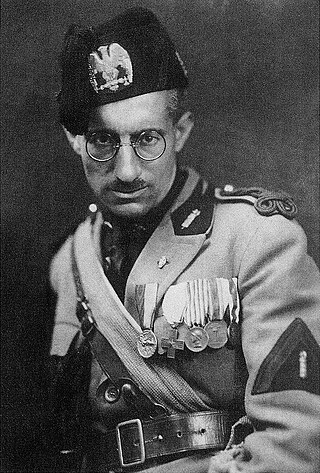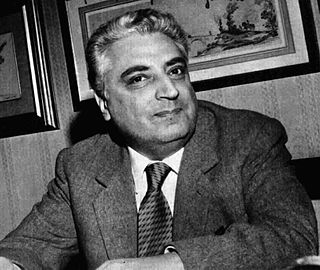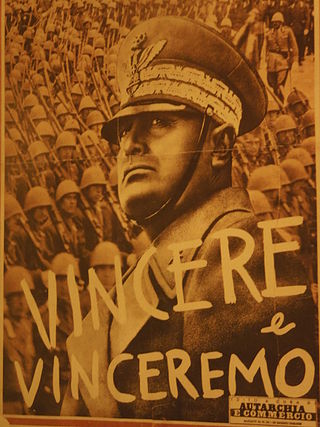The 1st Congress of the Fasci Italiani di Combattimento was held in Florence on 9 and 10 October 1919, following the proclamation of the Sansepolcro program on 23 March of the same year by Benito Mussolini. [1]
| Part of a series on |
| Fascism |
|---|
 |
The 1st Congress of the Fasci Italiani di Combattimento was held in Florence on 9 and 10 October 1919, following the proclamation of the Sansepolcro program on 23 March of the same year by Benito Mussolini. [1]
According to official data, the congress was attended by representatives of 137 groups for a total of 40,385 members, figures that the historian Renzo De Felice considers "very inflated for obvious propaganda purposes". [2] In fact, in the subsequent congress of Rome in 1921, the representation was retrospectively reduced to 56 bundles with about 17,000 members. [3]
Among the most important speeches: Umberto Fabbri of Rome, who presented the program of the movement, Filippo Tommaso Marinetti, who developed a violently anti-clerical discourse tending to impose "the expulsion of the papacy" from Italy (a goal that Marinetti defined as svaticanization), Giacomo Francia, delegate of Trani who addressed the problems of southern Italy, and Michele Bianchi, who supported the opportunity to maintain freedom of action in the electoral alliances (the majority instead supported the need to join only blocks of leftist interventionists). [1] [2]
Mussolini developed a very optimistic discourse, declaring that he had no prejudices either royalist or republican, he overshadowed the threat of an insurrection but at the same time declared that D'Annunzio's occupation of Fiume would be resolved positively without the need for a revolutionary uprising. He called for the abolition of press censorship, for future general elections he identified a coalition of leftist interventionists as the only possible alliance. He attacked the Nitti government and covertly the monarchy that supported it.
At the conclusion of the intervention, Mussolini proposed four agendas which were approved:
However, the strategy for the political elections approved by the congress turned out to be unsuccessful, highlighting the weakness of a movement that had only been established for a few months. The attempt to create an electoral bloc including the other forces of the interventionist left, such as republicans and revolutionary syndicalists, was rejected by the interlocutors. In conclusion: in Milan the fascists had to fall back on a single list with futurists, arditi and war volunteers (in which they had a very minority presence), in none of the other constituencies were they able to present their own lists. In some constituencies the combat bands ended up supporting liberal opposition lists to the government (thus doing the exact opposite of what had been decided by the congress). The electoral results were very modest.

Corriere della Sera is an Italian daily newspaper published in Milan with an average circulation of 246,278 copies in May 2023. First published on 5 March 1876, Corriere della Sera is one of Italy's oldest newspapers and is Italy's most read newspaper. Its masthead has remained unchanged since its first edition in 1876. It reached a circulation of over 1 million under editor and co-owner Luigi Albertini between 1900 and 1925. He was a strong opponent of socialism, clericalism, and Giovanni Giolitti, who was willing to compromise with those forces during his time as prime minister of Italy. Albertini's opposition to the Italian fascist regime forced the other co-owners to oust him in 1925.

The Italian Social Republic, known prior to December 1943 as the National Republican State of Italy, but more popularly known as the Republic of Salò, was a Nazi-German puppet state with limited diplomatic recognition that was created during the latter part of World War II, which existed from the beginning of the German occupation of Italy in September 1943 until the surrender of German troops in Italy in May 1945. The German occupation triggered widespread national resistance against it and the Italian Social Republic, leading to the Italian Civil War.

Giacomo Matteotti was an Italian socialist politician. On 30 May 1924, he openly spoke in the Italian Parliament alleging the Italian fascists committed fraud in the 1924 Italian general election, and denounced the violence they used to gain votes. Eleven days later, he was kidnapped and killed by Fascists.

Michele Bianchi was an Italian revolutionary syndicalist leader who took a position in the Unione Italiana del Lavoro (UIL). He was among the founding members of the Fascist movement. He was widely seen as the dominant leader of the leftist, syndicalist wing of the National Fascist Party. He took an active role in the "interventionist left" where he "espoused an alliance between nationalism and syndicalism." He was one of the most influential politicians of the regime before his succumbing to tuberculosis in 1930. He was also one of the grand architects behind the "Great List" which secured the parliamentary majority in favor of the fascists.

Alceste De Ambris was an Italian journalist, socialist activist and syndicalist, considered one of the greatest representatives of revolutionary syndicalism in Italy.

Renzo De Felice was an Italian historian, who specialized in the Fascist era, writing, among other works, a 6000-page biography of Mussolini. He argued that Mussolini was a revolutionary modernizer in domestic issues but a pragmatist in foreign policy who continued the Realpolitik policies of Italy from 1861 to 1922. Historian of Italy Philip Morgan has called De Felice's biography of Mussolini "a very controversial, influential and at the same time problematic re-reading of Mussolini and Fascism" and rejected the contention that his work rose above politics to "scientific objectivity", as claimed by the author and his defenders.

The history of fascist ideology is long and it draws on many sources. Fascists took inspiration from sources as ancient as the Spartans for their focus on racial purity and their emphasis on rule by an elite minority. Fascism has also been connected to the ideals of Plato, though there are key differences between the two. Fascism styled itself as the ideological successor to Rome, particularly the Roman Empire. From the same era, Georg Wilhelm Friedrich Hegel's view on the absolute authority of the state also strongly influenced fascist thinking. The French Revolution was a major influence insofar as the Nazis saw themselves as fighting back against many of the ideas which it brought to prominence, especially liberalism, liberal democracy and racial equality, whereas on the other hand, fascism drew heavily on the revolutionary ideal of nationalism. The prejudice of a "high and noble" Aryan culture as opposed to a "parasitic" Semitic culture was core to Nazi racial views, while other early forms of fascism concerned themselves with non-racialized conceptions of the nation.
Avanti! is an Italian daily newspaper, born as the official voice of the Italian Socialist Party, published since 25 December 1896. It took its name from its German counterpart Vorwärts, the party-newspaper of the Social Democratic Party of Germany.

The Fasci Italiani di Combattimento was an Italian fascist organisation created by Benito Mussolini in 1919. It was the successor of the Fasci d'Azione Rivoluzionaria, being notably further right than its predecessor. The Fasci Italiani di Combattimento was reorganised into the National Fascist Party in 1921.

The People of Freedom was a centre-right political party in Italy. The PdL launched by Silvio Berlusconi as an electoral list, including Forza Italia and National Alliance, on 27 February for the 2008 Italian general election. The list was later transformed into a party during a party congress on 27–29 March 2009. The party's leading members included Angelino Alfano, Renato Schifani, Renato Brunetta, Roberto Formigoni, Maurizio Sacconi, Maurizio Gasparri, Mariastella Gelmini, Antonio Martino, Giancarlo Galan, Maurizio Lupi, Gaetano Quagliariello, Daniela Santanchè, Sandro Bondi, and Raffaele Fitto.

The Italian Civil War was a civil war in the Kingdom of Italy fought during the Italian campaign of World War II between Italian fascists and Italian partisans and, to a lesser extent, the Italian Co-belligerent Army.

Benito Amilcare Andrea Mussolini was an Italian dictator who founded and led the National Fascist Party (PNF). He was Prime Minister of Italy from the March on Rome in 1922 until his deposition in 1943, as well as Duce of Italian fascism from the establishment of the Italian Fasces of Combat in 1919 until his summary execution in 1945 by Italian partisans. As dictator of Italy and principal founder of fascism, Mussolini inspired and supported the international spread of fascist movements during the inter-war period.

The Italian Social Movement was a neo-fascist political party in Italy. A far-right party, it presented itself until the 1990s as the defender of Italian fascism's legacy, and later moved towards national conservatism. In 1972, the Italian Democratic Party of Monarchist Unity was merged into the MSI and the party's official name was changed to Italian Social Movement – National Right.
The Fascio Rivoluzionario d'Azione Internazionalista was a political movement that advocated Italy's participation in World War I on the side of the Triple Entente against the Central Powers. The movement's manifesto was drawn up on 5 October 1914 by revolutionary syndicalists and left interventionists former members of the Unione Sindacale Italiana. The usefulness of the First World War was asserted as an indispensable historical moment for developing more advanced societies in a political-social sense. The manifesto inspired the formation of the Fasci d'Azione Rivoluzionaria.
Sansepolcrismo is a term used to refer to the movement led by Benito Mussolini that preceded Fascism. The Sansepolcrismo takes its name from the rally organized by Mussolini at Piazza San Sepolcro in Milan on March 23, 1919, where he proclaimed the principles of Fasci Italiani di Combattimento, and then published them in Il Popolo d'Italia, on June 6, 1919, the newspaper he co-founded in November 1914 after leaving Avanti!
The Futurist Political Party was an Italian political party founded in 1918 by Filippo Tommaso Marinetti as an extension of the futurist artistic and social movement. The party had a radical program which included promoting gender parity and abolishing marriage, inheritance, military service and secret police. The party was absorbed into the Fasci Italiani di Combattimento in 1919.
Events from the year 1919 in Italy.

Giordano Bruno Guerri is an Italian historian, writer, and journalist. He is an important scholar of twentieth-century Italy, in particular of the Fascist period and the relationship between Italians and the Catholic Church.

Vincenzo Costa was an Italian Fascist politician and soldier, the last federal secretary of the Fascist Party of Milan.
Left-interventionism was the part of the progressive interventionist movement of various left-wing matrices, such as those of Mazzinian, social reformist, democratic socialist, dissident socialist, reformist socialist, and revolutionary socialist persuasions, that saw in the Great War the historical opportunity for the completion of unification of Italy, and for those who later became part of the Italian fascist movement, such as Benito Mussolini, as the palingenesis of the Italian political system and the organization of the economic, legal, and social system, and therefore a profound change.